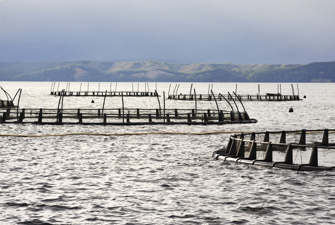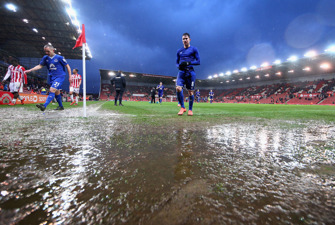Swimmers and surfers emerge from murky waters to campaign for rivers and oceans
COMMENT: As water temperatures rise and pollution worsens, climate justice activism amongst ocean, coastal and river users grows. But the politics of climate change also appear to prevent some groups from speaking out.
Comments on playthegame.org reflect the views of the author(s).
Sport is a powerful tool in responding to the multiplying impacts of climate change and water pollution.
When people swim, surf, sail or kayak, environmental impacts are felt in ways that have immediate consequences. Changes in biodiversity and the severity of storms and dune erosion on beaches are seen and felt. Pollution levels keep swimmers out of the water to protect their health. Climate change is experienced in the body – not as an abstract concept or something happening elsewhere.
Grassroots community movements populated by recreational participants are working to draw national and international attention to these problems. Examples include the successful ‘Fight for the (Australian) Bight’ protests against offshore oil drilling by the Norwegian energy giant, Equinor - a campaign that was led by Surfers for Climate and Surfrider Australia.
Campaigns in the UK include the Right to Roam activists fighting for public access to English land and waterways. Surfers Against Sewage report sewage outfall onto beaches and into rivers. Produced by both surfers and film makers, the documentary The Big Sea exposes the toxic effects of manufacturing the neoprene wetsuits used in water sports.
In contrast, high-level sporting organisations and industries are proving comparatively slow to acknowledge and react to such problems.
Video below: in May 2023 demonstrations were taking place at bathing spots around Britain in protest against the dumping of sewage into the country's seas and rivers. Video from Channel 4 News YouTube channel.
Activism grows from immersion in water pollution
People access and experience oceans, rivers and lakes as part of their everyday recreational experiences. Surfers paddle alongside sharks, dolphins and fish and sewage, oil and chemicals.
Environmental problems impact and become part of bodies as pollution accretes in the water that supports marine life. Humans leave pollution behind, including microplastics, sunscreen and pharmaceutical traces. Water-based sport and recreation resituates people in ecologies and reminds us how we are entangled with the water.
Environmentally aware surfers, swimmers, kayakers and fishers now adopt activist stances to protect their recreational experiences but such activism is far from new. Surfers in Sydney dealt with ‘Bondi cigars’ – an evocative description of sewage – in the 1970s and 1980s.
Surfers are literally immersed in water pollution, creating embodied connections – we become what the water is. Seeing and feeling sewage up close motivates surfers to advocate for the coasts they love, which extends to protesting ooffshoreoil and gas mining that threatens to impact cherished waterways and surfbreaks.
Some voices are marginalised in the fight for clean waters
Yet, the complexity of climate change are reflected in the marginalisation of diverse groups and worldviews. Like so much in sport, environmental activism is tied up in cultural politics over who has authority to speak for the oceans and rivers that people care so deeply about.
Research shows that water management, science and media are dominated by men from Western nations, leaving fewer opportunities for First Nations people, women, people of colour, young people, and people with disabilities. At the same time, there are politics over who is ‘local’ and thus who has rights to speak for how we should care for places.
For example, recent mass swim protests against a ‘no swimming’ notice in the UK ignored the concerns of land holders that the site was being loved to death by wild swimmers, resulting in erosion, rubbish and other forms of damage. While the protesters are committed to equitable forms of access to nature spaces that are locked up by wealthy landowners, the mass swim action contributed to increased pressure on the ecosystem and further increased public attention on the existence of the location of the site.
Similarly, actions by surfers in Australia initially failed to consider the colonial impacts of surfing on First Nations people and their genealogical knowledges and practices of care for coasts. Environmentally focused surfing groups are increasingly attending to these politics when organising and carrying out their activism.
Such tensions and contradictions can create discomfort for individual activists and groups. But the resulting discussions, arguments and changes recognise the deep links between social and environmental in/justices.
Lasting solutions to complex problems require interconnected, ecological ways of thinking that account for human diversity and systems, as much as they do animals, plants and waterways. Community activism organised in this way delivers real change in sporting cultures and politics and in the everyday lives of the people involved.







